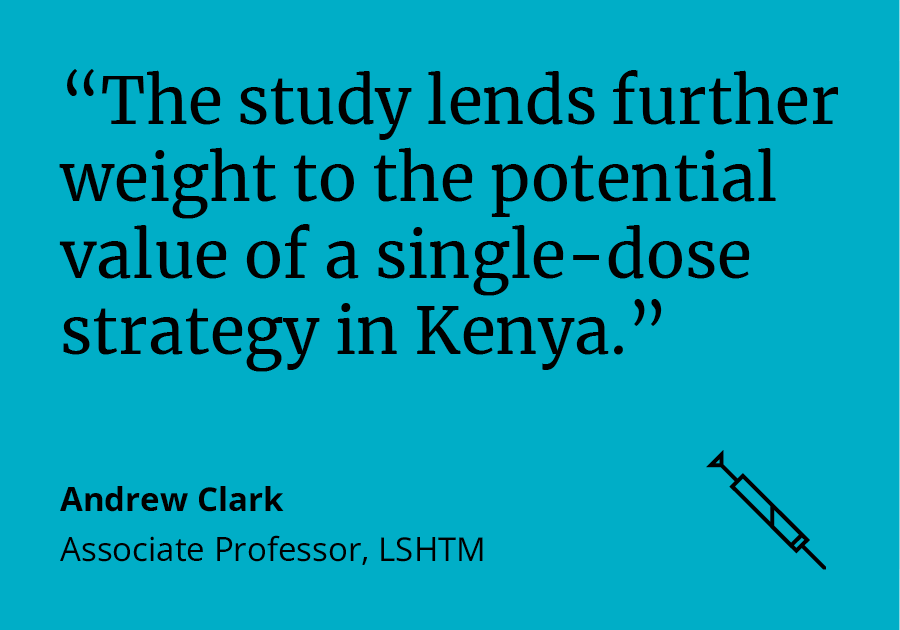
A decade of human papillomavirus (HPV) vaccination in Kenya could avert 137,000 cancer cases, according to new research published in Vaccine.
The study found that HPV vaccines are highly cost-effective when targeting Kenyan girls aged 10-14 years old. A single-dose strategy would be the most cost-effective option.
The research team included the Kenyan Ministry of Health, the Kenya Medical Research Institute, PATH and the London School of Hygiene & Tropical Medicine (LSHTM).
Kenya introduced a HPV vaccine, Gardasil-4®, for girls aged 10 years old in 2019 with support from Gavi, the Vaccine Alliance. The two doses of the vaccine were delivered via a health-facility-based vaccination strategy, with a catch-up campaign in 2021 to reach girls aged 11-14 who had been missed. While 77% of targeted girls received the first dose of the vaccine, only 31% received their second dose.
As Gavi support in Kenya may end soon, the research team evaluated the potential impact and cost-effectiveness of the Gardasil® vaccine, and available alternatives, to inform policymakers and guide the scaling up of HPV vaccination programmes.
Valerian Mwenda, a medical epidemiologist at the National Cancer Control Program of the Ministry of Health, Kenya, who led the research, said: “This study was very timely for Kenya because we are in the process of graduating from Gavi support. The study highlights the value of HPV vaccination and the need for sustained investment in the program. The cost of scaling-up our cervical cancer prevention efforts will be substantial so a reduced schedule or different HPV vaccine should be considered to help reduce costs and improve value for money.”
The research team used the UNIVAC decision support model to evaluate the potential impact and cost-effectiveness of introducing HPV vaccination in Kenya for 10-year-old girls over a ten-year period (2020-2029), with a catch-up campaign for girls aged 11-14 in the first year. Four different vaccines (Cervarix®, Cecolin®, Gardasil-4® and Gardasil-9®) were evaluated, comparing each option to a no vaccine scenario and to each other.
The study found that alternative vaccine products could provide similar or greater health benefits to the Gardasil-4® vaccine, but at a lower cost. Without the benefit of cross-protection (protection to HPV types that were not included in the vaccines), Cecolin®, Cervarix® and Gardasil-4® would each have a similar projected health impact of an estimated 42% reduction in cervical cancer cases and deaths. This is equivalent to approximately 137,000 cases and 97,000 deaths averted during the lifetimes of the vaccinated girls. Gardasil-9® was estimated to have a greater impact, reducing approximately 60% of cases and deaths.
Cecolin®, Cervarix® and Gardasil-4® are all Gavi-supported vaccines. From a societal perspective, accounting for direct medical and non-medical costs and indirect costs such as time lost from work due to cervical cancer, the averted healthcare costs of using these vaccines were substantial and exceeded the costs of introducing the vaccines, making them cost-saving options. A one-dose strategy would be cost-saving compared to no vaccination for all three Gavi-supported products.
Overall, without the benefit of cross-protection, Cecolin® was found to have the lowest net cost and was most cost-effective, making it the most attractive option. With cross-protection, Cervarix® became the most cost-effective and favourable choice. While Gardasil-9® was found to have a greater health impact, it is unlikely to be affordable or cost-effective compared to the evaluated alternatives.
Sub-Saharan Africa has the highest rate of cervical cancer cases and deaths worldwide, accounting for 20% of cases and 25% of deaths in 2018. Cervical cancer accounted for 12% of all cancer cases in Kenya in 2020. HPV vaccine uptake globally has been limited, with less than half of African countries introducing HPV vaccination despite the high rates.
To scale up, Kenya requires significant government investment and support with an estimated $10 million per year needed to achieve ambitious 90% coverage targets and sustain the vaccination programme as Kenya graduates from Gavi support.
Andrew Clark, Associate Professor at LSHTM who was involved in the study, said: “One of the main advantages of this study is that it was country-led, involving consultation with a range of national stakeholders. The study lends further weight to the potential value of a single-dose strategy in Kenya. This could reduce costs, improve cost-effectiveness, and make it easier for the vaccine to reach more Kenyan girls.”
The researchers hope that the findings from this study will guide Kenyan policymakers through future prioritisation, planning and implementation of a national HPV programme. They note that the study did not consider possible enhancements to the cervical cancer screening programme for females above the age of vaccination. They also assume that the efficacy of a single dose of HPV vaccine was equivalent to a two-dose strategy, based on recent research, however this may be optimistic.
LSHTM's short courses provide opportunities to study specialised topics across a broad range of public and global health fields. From AMR to vaccines, travel medicine to clinical trials, and modelling to malaria, refresh your skills and join one of our short courses today.
